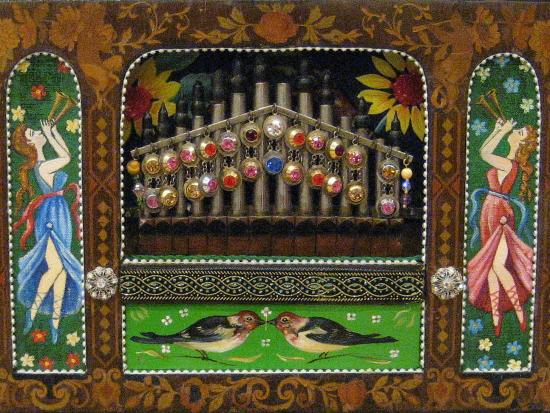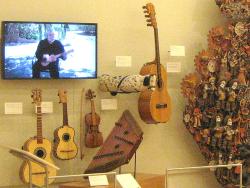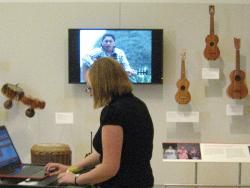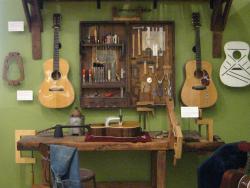
Music lovers have a new must-see attraction to add to their wish list: The Musical Instrument Museum (MIM) in Phoenix, Arizona. MIM, which opened in April of 2010, currently displays over 3000 instruments from around the world.

As if this weren’t impressive enough, MIM gives each visitor a small infrared device attached to headphones to guide them through the museum. As you approach displays, you hear information and music samples through these headphones and can watch matching videos, too. (Frankly, I would have liked the place even without those headphones, but having them really enhances the experience.)
Instruments are arranged by country of origin and very few are behind glass, making them easy to see from all angles. I had been forewarned about the vast amount on display, but even at a fairly brisk pace, it took several hours to see everything. MIM definitely does not skimp on the goods, and more displays are in the works.
Even though I was in a small group, we decided to split up, then reconnect at the cafe for lunch. This let everyone browse at their own pace, lingering on that which intrigued them, and skipping over sections of lesser interest.

For me, some of the highlights were the Afri-can Guitar, and the alligator-shaped Burmese zither, although it’s impossible to pick an absolute fave. What impressed me about the Afri-can guitar was how crude it looks, yet how good it sounds. I have since found a place called, Township Guitars which makes and sells them (they aren’t cheap, though!)
A funny thing happened as I checked out the Theremin exhibit; my phone rang. It was a wrong number, but what made it humorous is that my ringtone is a Theremin sample! I have been wanting to learn how to play the Theremin for years, so there is my sign, right?

MIM does a great job of putting the instruments in a cultural context and explaining the many roles music plays (no pun intended) around the world, from shamanistic healing rituals, to courting, to sheer entertainment.
MIM can be overwhelming, so I was content to come away with a few quirky tidbits of information rather than trying to absorb it all in one visit. For instance, in the 1800’s the Grand Harmonicon – an instrument played by rubbing the rims of glasses with wet fingertips – was a popular household instrument. Once people began noticing that players often developed nervous breakdowns, the Grand Harmonicon fell out of use. Back then, folks reasoned that the ethereal sound of the instrument disrupted people’s nervous systems. A more likely scenario is that musicians developed lead poisoning from the leaded crystal glasses and their painted rims.

MIM isn’t just for musicians. My fiance is a Mr. Fixit type, so what fascinated him were all the displays showcasing how instruments are made, such as the forging of bronze bells, and the woodwork involved in creating a Steinway piano. (And after seeing how thrilled I was by the Theremin, he offered to make me one – yea!)
I, on the other hand, had a more visceral reaction to the museum. After seeing and hearing all that music, I wanted to have a bbq and jam out with pals. Fortunately, the museum includes a hands-on Experience Gallery where visitors can play everything from marimbas to – you guessed it – the Theremin. Did I try it? You bet! It was tough, though. I do play several instruments, but there is going to be a learning curve with that Theremin.
For more information about MIM, check out the Musical Instrument Museum’s official website. They are open every day except Thanksgiving and Christmas, so the next time you are in Arizona swing on by.

[…] yes it’s me. Thought I would toss something into the hat this week, too, so I am sharing Playing Around at Arizona’s Musical Instrument Museum posted at Mental Mosaic: Even Home is a Travel Destination (as if you didn’t know where you […]
[…] See Tourist Attractions: In Playing Around at Arizona’s Musical Instrument Museum I share details about this incredibly fun new […]
I never knew this museum existed.u00a0 Sounds like a fun and educational one to visit.
It’s pretty new, but there were crowds. I learned a lot and would like to go back – the ultimate sign of a good museum! ~Tui